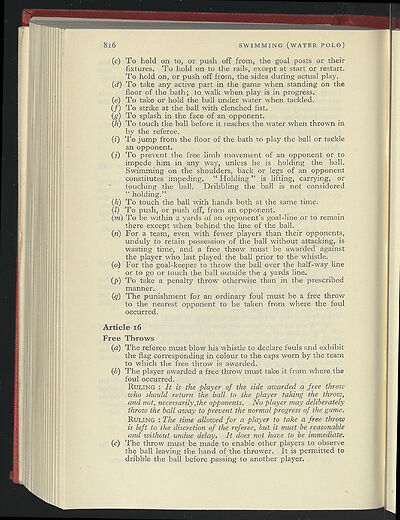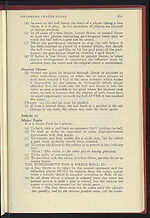1959-60
(892)
Download files
Complete book:
Individual page:
Thumbnail gallery: Grid view | List view

816 SWIMMING (WATER POLO)
(c) To hold on to, or push off from, the goal posts or their
fixtures. To hold on to the rails, except at start or restart.
To hold on, or push off from, the sides during actual play.
(d) To
take any active part in the game when standing on the
floor of the bath; to walk when play is in progress.
(e) To
take or hold the ball under water when tackled.
(f) To strike at the ball with clenched fist.
(g) To
splash in the face of an opponent.
(h) To
touch the ball before it reaches the water when thrown in
by the referee.
(i)
To
jump from the floor of the bath to play the ball or tackle
an opponent.
(j) To prevent the free limb movement of an opponent or to
impede him in any way, unless he is holding the ball.
Swimming on the shoulders, back or legs of an opponent
constitutes impeding. " Holding" is lifting, carrying, or
touching the ball. Dribbling the ball is not considered
" holding."
(k) To touch the ball with hands both at the same time.
(l) To push, or push off, from an opponent.
(m) To be within z yards of an opponent's goal-line or to remain
there except when behind the line of the ball.
(n)
For a team, even with fewer players than their opponents,
unduly to retain possession of the ball without attacking, is
wasting time, and a free throw must be awarded against
the player who last played the ball prior to the whistle.
(o) For the goal-keeper to throw the ball over the half-way line
or to go or touch the ball outside the 4 yards line.
(p) To take a penalty throw otherwise than in the prescribed
manner.
(q) The punishment for an ordinary foul must be a free throw
to the nearest opponent to be taken from where the foul
occurred.
Article i6
Free Throws
(a) The referee must blow his whistle to declare fouls and exhibit
the flag corresponding in colour to the caps worn by the team
to which the free throw is awarded.
(b)
The player awarded a free throw must take it from where the
foul occurred.
R
ULING
: It is the player of the side awarded a free throw
who should return the ball to the player taking the throw,
and not, necessarily,the opponents. No player may deliberately
throw the ball away to prevent the normal progress of the game.
R
ULING
: The time allowed for a player to take a free throw
is left to the discretion of the referee, but it must be reasonable
and without undue delay. It does not have to be immediate.
(c) The throw must be made to enable other players to observe
the ball leaving the hand of the thrower. It is permitted to
dribble the ball before passing to another player.
(c) To hold on to, or push off from, the goal posts or their
fixtures. To hold on to the rails, except at start or restart.
To hold on, or push off from, the sides during actual play.
(d) To
take any active part in the game when standing on the
floor of the bath; to walk when play is in progress.
(e) To
take or hold the ball under water when tackled.
(f) To strike at the ball with clenched fist.
(g) To
splash in the face of an opponent.
(h) To
touch the ball before it reaches the water when thrown in
by the referee.
(i)
To
jump from the floor of the bath to play the ball or tackle
an opponent.
(j) To prevent the free limb movement of an opponent or to
impede him in any way, unless he is holding the ball.
Swimming on the shoulders, back or legs of an opponent
constitutes impeding. " Holding" is lifting, carrying, or
touching the ball. Dribbling the ball is not considered
" holding."
(k) To touch the ball with hands both at the same time.
(l) To push, or push off, from an opponent.
(m) To be within z yards of an opponent's goal-line or to remain
there except when behind the line of the ball.
(n)
For a team, even with fewer players than their opponents,
unduly to retain possession of the ball without attacking, is
wasting time, and a free throw must be awarded against
the player who last played the ball prior to the whistle.
(o) For the goal-keeper to throw the ball over the half-way line
or to go or touch the ball outside the 4 yards line.
(p) To take a penalty throw otherwise than in the prescribed
manner.
(q) The punishment for an ordinary foul must be a free throw
to the nearest opponent to be taken from where the foul
occurred.
Article i6
Free Throws
(a) The referee must blow his whistle to declare fouls and exhibit
the flag corresponding in colour to the caps worn by the team
to which the free throw is awarded.
(b)
The player awarded a free throw must take it from where the
foul occurred.
R
ULING
: It is the player of the side awarded a free throw
who should return the ball to the player taking the throw,
and not, necessarily,the opponents. No player may deliberately
throw the ball away to prevent the normal progress of the game.
R
ULING
: The time allowed for a player to take a free throw
is left to the discretion of the referee, but it must be reasonable
and without undue delay. It does not have to be immediate.
(c) The throw must be made to enable other players to observe
the ball leaving the hand of the thrower. It is permitted to
dribble the ball before passing to another player.
Set display mode to:
![]() Universal Viewer |
Universal Viewer | ![]() Mirador |
Large image | Transcription
Mirador |
Large image | Transcription
| Games and sports in the army > 1959-60 > (892) |
|---|
| Permanent URL | https://digital.nls.uk/248874634 |
|---|
| Description | 'Games and Sports in the Army' was an annual publication produced by the British War Office between the 1930s and 1960s. This included the Second World War. It outlines the rules and regulations for games and sports played by members of the armed forces. It features names and photographs of team members, and examples of contemporary advertising. |
|---|---|
| Shelfmark | GWB.52 |

